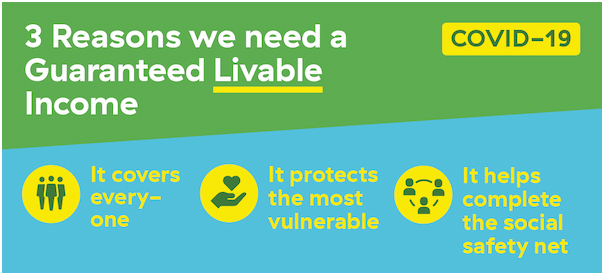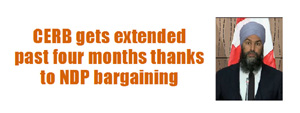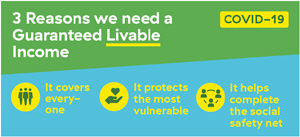Sunday August 9, 2020 ~ NATIONAL
by Mary Brooke | West Shore Voice News
The dramatic impact of job loss and economic shocks during the COVID-19 pandemic has given momentum to the call for a basic income.
In the past five months Canadians have seen and experienced the valid support to people in need as available through the taxable Canada Emergency Response Benefit (CERB) (has been available for 16 to 24 weeks, and in September 2020 is shifting over to a program under the Employment Insurance program), and in BC with the one-time tax-free BC Emergency Benefit for Workers (application available to December 2, 2020).
Green Party pushing Guaranteed Livable Income during leadership race:

Candidates in the current Green Party of Canada leadership race (vote comes up on October 4, 2020) are promoting the importance of instituting a guaranteed livable income (aka basic income) as part of the social safety net for Canadians.

There are nine contestants in the Green leadership race from a wide range of locations across Canada including David Merner here on Vancouver Island who ran for the Green Party in 2019 in Esquimalt-Saanich-Sooke. Toronto lawyer Annamie Paul and physician Dr Courtney Howard practising in Yellowknife have generated a high profile in recent weeks as well. All candidates have interest or experience in environmental and social initiaitives.
Long-time leader Elizabeth May (during 2006-2019) resigned from party leadership last fall, shortly after the October 2019 federal election. She is still the MLA for Saanich-Gulf Islands (2011 to present) and is active in the House of Commons. Jo-Ann Roberts is presently the Green Party’s interim leader.
Basic income as part of the society safety net:
A guaranteed livable income (GLI) would be a backstop when people lose their job, similar to the way that the CERB helped people cope until economic conditions started to stabilize.
A guaranteed livable income is a mechanism that helps prevent financial backslide for individuals who are out of work (and helps to mitigate the social and mental health issues that often occur along with financial crisis).

Changing the entire social safety net has become an obvious exercise during the sudden and dramatic economic impacts as a result of the COVID-19 pandemic.
“The COVID-19 crisis has exposed how many Canadians live in precarious conditions and still lack a basic safety net to protect them in times of financial difficulty,” it is stated in Green Party policy. “Instead of plugging holes one-by-one, the solution is to create a comprehensive benefit: Guaranteed Livable Income (GLI). GLI would provide every Canadian with a basic revenue source, ensuring that people can cover basic expenses such as food and accommodation.”
As stated in Green policy (in their 2014 materials): “The GLI would replace federal transfers for social assistance (welfare), disability supports, the Old Age Supplement (OAS) and the Guaranteed Income Supplement (GIS) for the elderly, the Canadian Child Tax Benefit (CCTB) and National Child Benefit Supplement (NCB) for parents with children, and the Working Income Tax Benefit for the poor – all of which are already very GLI-like.”
NDP has provided the political baseline:
During the height of Phase 1 in the ongoing COVID-19 pandemic, Canada’s NDP party was almost entirely responsible for ensuring (through the leverage of a minority government) what became the very popular CERB program was actually delivered in a way that addressed people basic needs.

It was the NDP — through leader Jagmeet Singh — who articulated the wide range of Canadians who were falling between the cracks of the economy, including gig and contract workers, people who are self-employed, and students. It has been quite astonishing how the Liberal government needed this direction from the NDP and others, indicating that the former majority Liberals really hadn’t much of an idea of how Canadians were experiencing the economy in real time prior to the pandemic.
COVID has shone a very bright light on the cracks in the Canadian economic system, in particular how the social safety net has become in many ways outmoded and ineffectual, in some ways almost contributing to income disparity and even poverty.


